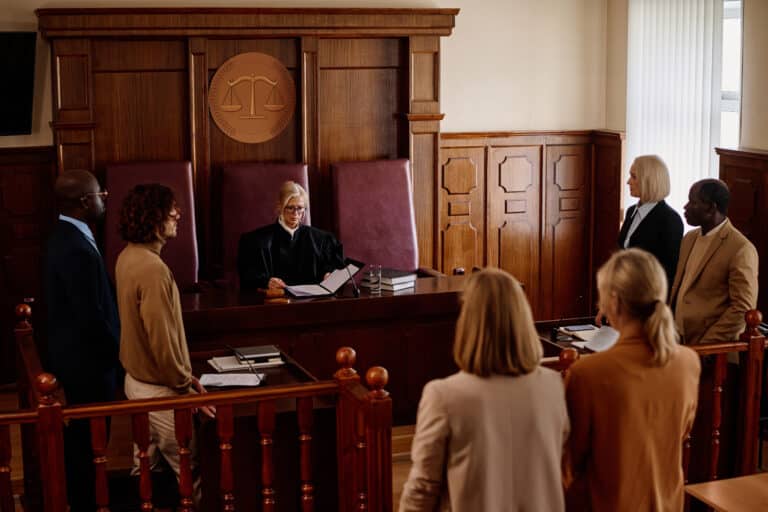Contempt of New York Court Orders
Trust our team of expert attorneys in Manhattan and Brooklyn to help with your case.
When a court issues an order, it expects that order to be followed. But what happens when someone fails to comply? This could result in contempt of court in New York, a serious legal matter with potentially severe consequences. Whether you are facing allegations of contempt or need to enforce a court order, understanding the legal process is essential to protecting your rights.
What is Contempt of Court in New York?
Contempt of court in New York occurs when an individual disobeys a lawful court order, disrupts legal proceedings, or interferes with the administration of justice. Common examples include:
- Failing to comply with child support or custody orders
- Refusing to follow a spousal support agreement
- Tampering with official court documents
- Withholding evidence or ignoring subpoenas
- Disrupting court proceedings or defying a judge’s authority
Contempt cases fall into four main categories, each with distinct legal implications.
Types of Contempt of Court in New York
1. Civil Contempt
Civil contempt is used to compel compliance with a court order rather than to punish the offender. It is common in family law cases, where one party refuses to fulfill obligations such as paying child support or allowing court-ordered visitation. Judges may impose fines, wage garnishment, or jail time until compliance is achieved.


2. Criminal Contempt
Criminal contempt is considered a crime and involves deliberate defiance of the court’s authority. It may include threatening a judge, disrupting courtroom proceedings, or refusing to testify when legally required. Punishment for criminal contempt can include fines, probation, or jail time.
3. Direct Contempt
Direct contempt occurs inside the courtroom, typically in front of a judge. Examples include disruptive behavior, refusing to answer questions, or verbally challenging the judge. Judges can immediately impose penalties, such as fines or removal from the courtroom.


4. Indirect Contempt
Indirect contempt happens outside the courtroom, but still violates a court order. This often involves noncompliance with child support, custody, or spousal maintenance orders. The court may hold hearings and enforce compliance through financial penalties or legal enforcement actions.
Enforcement of Court-Ordered Child Support in New York
One of the most common reasons for contempt of court in New York is failure to pay child support. Courts use administrative and judicial enforcement to recover overdue payments.
Administrative Enforcement (Automated Processes)
New York agencies can automatically enforce child support orders without a court hearing. These enforcement methods include:
- Tax Refund Offset – Seizing federal or state tax refunds to cover unpaid support.
- Wage Garnishment – Courts may order withholding of up to 50–55% of a person’s disposable income to cover overdue child support. The higher percentage (55%) applies when the individual has been in arrears for more than 12 weeks.
- Lottery Winnings Intercept – Seizing lottery prizes over $600 if past-due child support exists.
- Credit Bureau Reporting – Reporting delinquent accounts over $1,000, affecting credit scores.
- License Suspension – Suspending driver’s or professional licenses if payments are four months behind.
- Passport Denial – Denying a U.S. passport if child support arrears exceed $2,500.
Judicial Enforcement (Court-Imposed Penalties)
If administrative enforcement is not successful, the custodial parent can seek judicial enforcement through the court system. These penalties may include:
- Violation Petition – Requesting the court to enforce the child support order.
- Money Judgment – Issuing a formal court ruling for unpaid support, including interest and legal fees.
- Arrest/Incarceration – Issuing a warrant for noncompliance, potentially leading to jail time.
- State-Issued License Suspension – Revoking business, recreational, or professional licenses.
- Criminal Prosecution – Charging a parent with a state or federal crime for willful nonpayment.
Child support is a legal obligation, not an optional expense. Failing to comply with a support order can lead to long-term financial and legal consequences. If a parent is struggling to meet their obligations, they should seek a child support modification rather than ignore payments.
What Happens If You Are Found in Contempt of Court in New York?
Judges have broad discretion in handling contempt of court in New York, tailoring penalties based on the severity of the violation and the individual’s history of compliance.
If a court rules that someone is in contempt, they may face one or more of the following:
- Fines – Imposed to compel compliance or punish noncompliance.
- Make-Up Parenting Time – May be granted to a parent who was denied scheduled visitation, allowing them to recover lost time and maintain their court-ordered relationship with the child.
- Wage Garnishment – Used to recover unpaid financial obligations.
- License Suspension – Driver’s, business, or professional licenses may be revoked.
- Jail Time – Ordered in serious cases of willful defiance, particularly for criminal contempt.
Judges consider several factors when determining penalties, including the seriousness of the offense, whether the violation was intentional, and whether the individual has a history of failing to comply with court orders.
If you are facing allegations of contempt of court in New York, our experienced attorneys can help you understand your rights and find the best legal solution.
Steps to Take if You Are Accused of Contempt in Family Court
Being accused of contempt of court in New York can have serious legal and financial consequences. If you are facing contempt charges, follow these steps to protect yourself:
- Respond Promptly – Ignoring a contempt charge can lead to harsher penalties.
- Understand the Allegations – Review the motion carefully to determine which order you allegedly violated.
- Consult a Family Law Attorney – An attorney can help build a defense or negotiate a modification of the order.
- Gather Supporting Evidence – Provide proof of payments, medical emergencies, or financial hardships that explain the violation.
- Take Immediate Steps to Comply – Making partial payments or correcting violations before the hearing can help reduce penalties.
- Attend All Court Hearings – Failing to appear could result in a default ruling against you.
- Request a Modification If Necessary – Courts may adjust obligations if circumstances have changed.
- Follow Legal Advice Closely – Acting impulsively or ignoring legal advice can worsen the situation.

If you are accused of contempt, acting quickly and strategically can help you avoid major legal consequences. Ignoring the issue or failing to defend yourself could result in long-term financial, parental, and legal repercussions. Seeking legal representation early can help you resolve the matter and protect your rights.
Protecting Your Rights in Contempt Cases
At Brian D. Perskin & Associates, we know how stressful contempt of court in New York cases can be. Our experienced family law attorneys will assess your case, develop a strong legal strategy, and advocate on your behalf—whether that means filing for a modification, defending against a contempt charge, or pursuing enforcement of a court order. We are committed to protecting your rights and securing the best possible outcome for you and your family.
Top New York Family Law Attorneys
Schedule a Consultation Today
- (866) 932-8389
- 44 Court Street Suite 1210, Brooklyn, NY 11201
- 122 East 42nd Street 4th Floor, New York, NY 10168